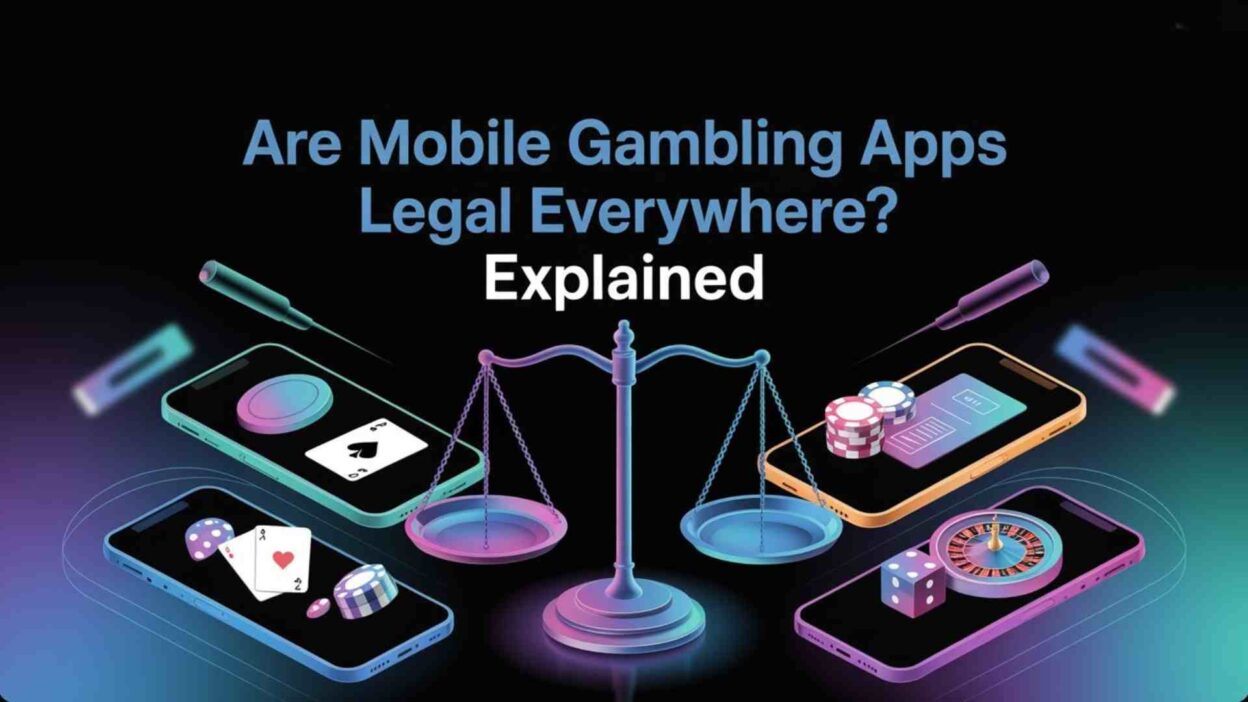TL;DR Mobile gambling has exploded in popularity over the past decade as smartphone technology advances. Players can now access their favorite casino games, sports betting platforms, and poker rooms from anywhere. The question “Are mobile gambling apps legal?” creates confusion for millions of potential users worldwide.
Table of Contents
Legal regulations surrounding mobile gambling vary dramatically across different countries, states, and jurisdictions. What remains perfectly legal in one location may result in serious penalties just miles away. Understanding these complex legal landscapes protects players from potential legal troubles and financial losses.
Technology moves faster than lawmakers can create comprehensive gambling regulations. This gap creates gray areas where mobile gambling exists in legal limbo. Players need clear information about where they can legally gamble using mobile devices.
This comprehensive guide explores mobile gambling legality across various jurisdictions worldwide. We’ll examine specific countries, states, licensing requirements, and regulatory frameworks governing mobile gambling. Your understanding of these laws helps you make informed decisions about mobile gambling participation.
Understanding Mobile Gambling Legality
Mobile gambling encompasses any form of wagering conducted through smartphones, tablets, or other portable devices. Casino games, sports betting, poker, lottery purchases, and daily fantasy sports all fall under mobile gambling. Each category faces different legal standards and restrictions depending on location.
Internet gambling laws generally apply to mobile gambling since both involve remote wagering technology. Lawmakers rarely distinguish between desktop and mobile gambling in legal statutes. Regulations targeting online gambling automatically include mobile platforms in most jurisdictions.
Licensing requirements ensure mobile gambling operators meet specific standards for fairness, security, and responsible gaming. Legitimate operators obtain licenses from recognized gambling authorities before offering services. Players should verify licensing credentials before using any mobile gambling platform.
Enforcement challenges arise because mobile gambling crosses geographic boundaries effortlessly. Players in restricted jurisdictions can potentially access offshore gambling sites through mobile apps. Legal authorities struggle to prevent access to international gambling platforms effectively.
Gray market gambling describes unlicensed operations serving customers in jurisdictions without clear legal frameworks. These platforms operate in legal ambiguity rather than outright illegality. Players face an uncertain legal status when using gray market mobile gambling services.
Banking regulations affect mobile gambling legality through restrictions on gambling-related financial transactions. Payment processors may block deposits to gambling sites even where gambling itself remains legal. Financial transaction restrictions create practical barriers regardless of gambling’s legal status.
Mobile Gambling Laws in the United States
Federal laws like the Wire Act and Unlawful Internet Gambling Enforcement Act regulate certain aspects of online gambling. The Wire Act prohibits sports betting across state lines using electronic communications. UIGEA targets payment processing for unlawful internet gambling rather than individual players.
State-level legislation determines whether mobile gambling apps operate legally within specific states. Each state maintains authority to legalize, regulate, or prohibit various forms of mobile gambling. This state-by-state approach creates a patchwork of different legal standards nationwide.
New Jersey pioneered legal mobile gambling in the United States through comprehensive online casino regulations. Licensed operators offer full casino games and sports betting through mobile applications legally. Players must physically be within New Jersey borders to access these mobile gambling services.
Nevada allows legal mobile sports betting through licensed operators connected to land-based casinos. Mobile casino games face more restrictions despite Nevada’s reputation as a gambling haven. Geolocation technology ensures players remain within state boundaries during mobile gambling sessions.
Pennsylvania, Michigan, West Virginia, and Delaware have established legal mobile gambling markets. Each state implements unique regulations regarding licensing, taxation, and available gambling types. Legal mobile gambling continues expanding to new states annually.
States without legal mobile gambling frameworks prohibit such activities through existing gambling laws. Players in these states cannot legally access mobile gambling apps from licensed domestic operators. Offshore mobile gambling sites create legal uncertainty for players in non-regulated states.
Tribal gaming jurisdictions follow federal Indian Gaming Regulatory Act provisions allowing mobile gambling on tribal lands. Some tribes offer mobile gambling apps accessible only within their reservation boundaries. Complex jurisdictional issues arise when tribal mobile gambling serves non-tribal members.
European Mobile Gambling Regulations
The United Kingdom maintains one of the world’s most comprehensive mobile gambling regulatory frameworks. The UK Gambling Commission licenses operators meeting strict standards for player protection and fairness. British residents can legally access hundreds of licensed mobile gambling applications.
The Malta Gaming Authority issues licenses recognizable throughout the European Union for mobile gambling operators. Maltese licenses allow operators to serve customers across multiple EU member states legally. Many international gambling companies establish operations in Malta due to the favorable regulations.
Gibraltar licenses mobile gambling operators serving customers worldwide from this British territory. The Gibraltar Gambling Commission enforces strict regulatory standards for licensed operators. Gibraltar-licensed mobile gambling apps enjoy strong reputations for reliability and legitimacy.
Individual EU member states maintain sovereign authority over gambling regulations within their borders. Countries like Germany, France, Spain, and Italy each implement unique mobile gambling frameworks. Cross-border gambling within the EU creates complex legal situations requiring careful navigation.
Sweden transitioned to a licensed mobile gambling market in 2019 after years of unregulated activity. Svenska Spel no longer holds a monopoly as multiple operators compete for Swedish customers. Swedish residents can legally use mobile gambling apps from locally licensed operators.
Denmark, Belgium, and the Czech Republic maintain regulated mobile gambling markets with varying restrictions. Licensed operators must comply with advertising standards, responsible gambling measures, and taxation requirements. Each country enforces unique rules regarding available games and betting options.
Eastern European countries maintain varied approaches ranging from complete prohibition to unregulated gray markets. Poland recently implemented restrictive regulations limiting mobile gambling severely. Romanian regulations allow licensed mobile gambling, while Bulgarian laws remain less clear.
Mobile Gambling in Asia
Macau serves as Asia’s gambling capital, but it restricts mobile and online gambling severely. Only land-based casinos operate legally, while mobile gambling remains prohibited. Authorities block access to offshore mobile gambling sites aggressively.
The Philippines licenses offshore gambling operators serving international customers but not domestic players. Philippine Offshore Gaming Operators conduct mobile gambling businesses targeting Asian markets. Filipino citizens cannot legally participate in these mobile gambling operations.
Japan prohibits most gambling but allows betting on specific sports like horse racing through licensed operators. Mobile applications for legal betting exist within these narrow categories. Casino gambling, including mobile platforms, remains illegal for Japanese residents.
Singapore maintains strict gambling regulations, allowing only two integrated resort casinos. Online and mobile gambling remain illegal with severe penalties for violations. Authorities actively block access to offshore mobile gambling platforms.
Hong Kong permits betting on horse racing and lottery through government-controlled entities only. Mobile applications exist for these limited legal gambling options. Other forms of mobile gambling violate Hong Kong’s gambling ordinances.
India’s gambling laws vary by state, creating complex mobile gambling legal situations. Sikkim and Nagaland have licensed some online gambling operators offering mobile access. Most Indian states prohibit gambling, making mobile gambling apps illegal in those jurisdictions.
China prohibits all forms of gambling, including mobile applications, with very limited exceptions. Macau and Hong Kong maintain separate legal systems, allowing some gambling. Mainland China enforces gambling prohibitions strictly with criminal penalties.
Mobile Gambling Legality in Canada
Canadian federal law allows provinces to regulate gambling within their territories independently. Each province operates government-run gambling operations while private operators face restrictions. This framework creates varied mobile gambling legal status across Canadian provinces.
Ontario launched a regulated mobile gambling market in 2022, allowing private operators to obtain licenses. Numerous international gambling companies now offer legal mobile gambling to Ontario residents. Other provinces maintain provincial monopolies on mobile gambling services.
British Columbia, Quebec, and the Atlantic provinces offer mobile gambling through government-operated platforms only. Private mobile gambling apps remain technically illegal, though enforcement focuses on operators rather than players. Offshore mobile gambling sites serve Canadian customers in legal gray areas.
Sports betting through single-game wagers became legal nationwide in Canada in 2021. Provinces regulate mobile sports betting within their borders following this federal change. Mobile sports betting apps from provincial operators and licensed private companies serve Canadian bettors.
Offshore mobile gambling sites target Canadian players despite questionable legal status. Banks generally process transactions to these sites without interference. Canadians face minimal legal risk using offshore mobile gambling apps, though operators lack Canadian licenses.
Criminal Code provisions prohibit unlicensed gambling operations but rarely target individual players. Law enforcement focuses on illegal gambling operators rather than participants. This approach creates practical safety for mobile gambling users even in unregulated provinces.
Australian Mobile Gambling Laws
The Interactive Gambling Act of 2001 prohibits offering certain online gambling services to Australian residents. Online casino games and in-play sports betting fall under these prohibitions. Licensed sports betting and lottery services can operate legally through mobile applications.
Australian states license sports betting operators who offer mobile apps to Australian customers legally. These mobile gambling apps provide pre-match sports betting and racing wagering services. Hundreds of thousands of Australians use legal mobile sports betting applications regularly.
Offshore casino gambling sites serve Australian customers despite the IGA prohibitions. Authorities target operators rather than individual players, creating practical access to mobile casino apps. Banking restrictions attempt to prevent transactions to unlicensed gambling sites.
Mobile lottery applications operate legally through state-run lottery organizations. Australians can purchase lottery tickets and play certain games through official mobile apps. These government-operated services face no legal restrictions.
Poker and casino games remain illegal through mobile applications for Australian residents under federal law. Enforcement focuses on advertising and operating rather than individual users. Many Australians still access offshore mobile casino apps despite legal prohibitions.
Debate continues about modernizing Australian gambling laws to reflect current technology and player preferences. Some advocate for regulated mobile casino markets similar to sports betting frameworks. Current laws remain unchanged, leaving mobile casino gambling in legal limbo.
Latin American Mobile Gambling Markets
Argentina allows provinces to regulate gambling, including mobile applications, independently within their territories. Buenos Aires and other provinces have licensed mobile sports betting and casino operators. Legal mobile gambling expands gradually across Argentina’s provincial system.
Colombia established a regulated gambling market allowing licensed mobile gambling operators since 2016. International operators obtained licenses to serve Colombian customers through mobile apps legally. Mobile gambling advertising faces specific regulations and restrictions.
Mexico permits gambling through licensed operators, though mobile gambling regulations remain underdeveloped. Sports betting through mobile apps exists in legal gray areas with limited enforcement. Mexican authorities focus on illegal land-based operations rather than mobile gambling.
Brazil debated mobile gambling legalization extensively, with sports betting finally approved in late 2023. Regulatory frameworks for licensed mobile gambling continue to develop throughout 2024 and beyond. The massive Brazilian market attracts international mobile gambling operators.
Chile maintains restrictive gambling laws, allowing only government-operated gambling with limited mobile options. Unauthorized mobile gambling remains illegal, though enforcement focuses on operators. Chilean residents access offshore mobile gambling sites despite legal restrictions.
Peru licenses gambling operators who can offer mobile applications to Peruvian customers legally. Regulations cover sports betting, casino games, and other gambling types through mobile platforms. Licensed mobile gambling operates within established legal frameworks.
Middle Eastern Mobile Gambling Restrictions
Most Middle Eastern countries prohibit gambling entirely based on religious and cultural values. Mobile gambling apps violate these comprehensive gambling bans. Authorities block access to international gambling sites and penalize violations severely.
The United Arab Emirates prohibits all gambling, including mobile applications, with criminal penalties. Authorities actively block gambling websites and applications from UAE internet connections. Residents caught gambling face fines, imprisonment, and deportation for expatriates.
Saudi Arabia maintains a complete gambling prohibition with severe criminal penalties, including possible corporal punishment. Mobile gambling violates both religious law and civil statutes. Authorities block access to gambling sites and monitor internet usage.
Turkey prohibits most gambling forms, including mobile applications, with limited exceptions for the state lottery. Authorities block thousands of unlicensed gambling websites regularly. Mobile gambling remains illegal for Turkish residents despite widespread offshore site access.
Israel permits some gambling forms through government monopoly but prohibits most online and mobile gambling. Enforcement focuses on operators rather than individual players. Israeli residents access offshore mobile gambling sites despite questionable legal status.
Lebanon allows casino gambling but prohibits online and mobile gambling operations. Land-based casinos operate legally while mobile applications remain illegal. Offshore mobile gambling sites serve Lebanese customers in legal gray areas.
African Mobile Gambling Development
South Africa licenses gambling operators at provincial levels with varying approaches to mobile gambling. Some provinces allow mobile gambling through licensed operators, while others restrict it. South African mobile gambling laws continue evolving as technology advances.
Kenya established a regulated mobile gambling market with numerous licensed operators. Mobile sports betting became extremely popular among young Kenyans. Recent tax increases and licensing changes created challenges for the mobile gambling industry.
Nigeria maintains fragmented gambling regulations with federal and state-level authority overlapping. Some states prohibit gambling while others allow licensed operations, including mobile apps. Nigeria’s large population attracts international mobile gambling operators despite regulatory uncertainty.
Uganda licenses sports betting operators offering mobile applications to Ugandan customers. Mobile gambling grew rapidly, creating concerns about addiction and youth gambling. Authorities implemented restrictions and monitoring requirements for licensed operators.
Tanzania recently banned all online and mobile gambling, closing previously licensed operations. Authorities cited social concerns and revenue disputes with operators. The sudden prohibition eliminated a growing mobile gambling market.
Ghana licenses mobile gambling operators through the Gaming Commission with established regulatory standards. Mobile sports betting remains popular while casino app regulations face stricter scrutiny. Licensed operators serve Ghanaian customers through approved mobile applications.
Licensing and Regulatory Bodies
The UK Gambling Commission represents the gold standard for mobile gambling regulation worldwide. Rigorous licensing requirements ensure operator integrity, financial stability, and player protection measures. UK licenses carry significant weight in international gambling markets.
Malta Gaming Authority issues multiple license types for different mobile gambling services. Class 1 licenses cover games of chance, while Class 2 covers skill games. Maltese licenses provide access to European markets through regulatory recognition.
Curacao e-Gaming licenses offer more accessible entry points for mobile gambling operators. Lower costs and less stringent requirements attract many operators to Curacao licensing. Curacao licenses carry less prestige but allow legitimate mobile gambling operations.
The Kahnawake Gaming Commission in Canada licenses mobile gambling operators serving international markets. This tribal authority maintains respected regulatory standards despite being less known globally. Kahnawake-licensed mobile gambling sites operate internationally.
Alderney Gambling Control Commission licenses mobile gambling operators meeting British Crown dependency standards. Smaller scale than the UK or Malta, but maintains rigorous regulatory oversight. Alderney licenses are particularly common among poker and casino operators.
The Isle of Man Gambling Supervision Commission licenses mobile gambling operators under British Crown oversight. Strong regulatory framework attracts quality operators seeking respected licensing jurisdictions. Isle of Man licenses indicate serious mobile gambling operations.
Responsible Gambling and Player Protection
Age verification systems prevent minors from accessing mobile gambling applications. Licensed operators implement multiple verification steps before allowing real money wagering. Strict age restrictions protect young people from gambling harm.
Self-exclusion programs allow problem gamblers to voluntarily block access to mobile gambling apps. Multi-operator exclusion schemes prevent gambling across multiple platforms simultaneously. These programs provide critical support for addiction recovery.
Deposit limits enable players to control their mobile gambling spending proactively. Daily, weekly, and monthly limits prevent excessive losses. Responsible operators make limit-setting easy and prominent.
Reality checks interrupt mobile gambling sessions periodically to inform players of the time and money spent. These mandatory notifications encourage conscious gambling decisions. Reality checks help prevent excessive gambling sessions.
Problem gambling resources must be accessible within mobile gambling applications. Links to support organizations, counseling services, and educational materials help struggling players. Licensed operators fund problem gambling treatment and research.
Advertising restrictions prevent mobile gambling promotions targeting vulnerable populations. Children, problem gamblers, and other at-risk groups require protection from aggressive marketing. Responsible advertising standards maintain industry legitimacy.
Payment Methods and Banking
Credit card restrictions prevent gambling purchases in many jurisdictions, even where gambling remains legal. Banks and card networks may block gambling-related transactions as risk management. Alternative payment methods fill gaps created by credit card restrictions.
E-wallets provide popular mobile gambling payment solutions offering speed and privacy. PayPal, Skrill, Neteller, and other services facilitate deposits and withdrawals. Some e-wallets specifically cater to gambling customers.
Cryptocurrency payments offer advantages for mobile gambling, including anonymity and international accessibility. Bitcoin, Ethereum, and other cryptocurrencies bypass traditional banking restrictions. Crypto gambling grows despite regulatory uncertainty.
Bank transfer options remain available for mobile gambling, though processing times are slower. Direct banking methods provide security and high transaction limits. Mobile gambling sites accommodate various banking preferences.
Prepaid cards and vouchers enable mobile gambling without linking bank accounts or credit cards. Paysafecard and similar services provide anonymous deposit methods. Prepaid options appeal to privacy-conscious mobile gambling users.
Mobile payment integration through Apple Pay, Google Pay, and carrier billing simplifies deposits. One-touch payments streamline mobile gambling experiences. These methods are gaining popularity as mobile gambling expands.
Frequently Asked Questions
Are mobile gambling apps legal in my country?
The question “Are mobile gambling apps legal?” depends entirely on your specific location and jurisdiction. Countries like the United Kingdom, Canada, and many European nations maintain regulated mobile gambling markets. Licensed operators serve customers legally in these jurisdictions through approved mobile applications.
Many countries prohibit mobile gambling entirely, including most Middle Eastern nations and several Asian countries. China, the United Arab Emirates, and Saudi Arabia enforce strict prohibitions with criminal penalties. Players in these countries cannot legally access mobile gambling apps.
The United States presents complex situations where individual states determine mobile gambling legality independently. States like New Jersey, Pennsylvania, and Michigan allow legal mobile gambling through licensed operators. Other states prohibit mobile gambling, making such apps illegal for residents.
Researching your specific jurisdiction’s laws remains essential before using mobile gambling applications. Legal consequences vary from fines to imprisonment, depending on the location. Consult local gambling laws or legal professionals for definitive answers.
Can I use offshore mobile gambling apps legally?
Offshore mobile gambling sites operate from jurisdictions with favorable licensing requirements. These platforms serve customers in countries where domestic mobile gambling remains unavailable or restricted. The legal status of using offshore apps varies by jurisdiction.
Some countries, like Australia, prohibit offering online casino gambling to residents but don’t penalize individual users. Players face minimal legal risk using offshore mobile gambling apps in these jurisdictions. Enforcement targets operators rather than participants.
Other jurisdictions criminalize participating in unauthorized gambling, making offshore mobile app usage illegal. Players risk fines or criminal charges depending on local laws. Banking restrictions may prevent deposits to offshore gambling sites, effectively blocking access.
Offshore mobile gambling apps lack consumer protections available through licensed domestic operators. Dispute resolution and fund security depend on operator integrity without regulatory oversight. Players accept increased risks when using unlicensed mobile gambling platforms.
Do I need to pay taxes on mobile gambling winnings?
Tax obligations on mobile gambling winnings depend on your country’s tax laws. The United States requires reporting all gambling winnings as taxable income, regardless of the amount. Professional gamblers face additional self-employment tax requirements.
The United Kingdom does not tax gambling winnings for recreational players. Casino, sports betting, and poker winnings remain tax-free for UK residents. Professional gamblers may face different tax treatment.
Canada generally does not tax gambling winnings unless gambling represents a business activity. Recreational mobile gambling winnings remain tax-free for Canadian residents. Professional gamblers report earnings as business income.
Australia does not tax recreational gambling winnings, including mobile gambling profits. Professional gamblers declare winnings as business income subject to taxation. Most mobile gambling users face no tax obligations on winnings.
Consult tax professionals familiar with gambling taxation in your jurisdiction. Failing to report required gambling income creates legal problems. Proper record-keeping supports accurate tax reporting.
How do authorities enforce mobile gambling laws?
Law enforcement focuses primarily on illegal gambling operators rather than individual players. Authorities target unlicensed mobile gambling companies offering services in prohibited jurisdictions. Operators face prosecution, fines, and asset seizures for illegal activities.
Internet service providers may block access to unlicensed mobile gambling sites following government orders. Website blocking prevents users from accessing prohibited platforms directly. VPN services allow users to circumvent these blocks though doing so may violate laws.
Payment processors face regulations preventing transactions to unlicensed gambling operators. Banks and credit card companies block gambling-related payments in restricted jurisdictions. Financial restrictions create practical barriers to illegal mobile gambling.
Individual players rarely face prosecution for using mobile gambling apps, even where technically illegal. Authorities lack resources to pursue individual users at scale. Enforcement priorities target suppliers rather than consumers.
Some jurisdictions do penalize individual mobile gambling participants with fines or criminal charges. Countries with strict gambling prohibitions may prosecute users of illegal apps. Understanding local enforcement approaches helps assess personal legal risks.
What protections exist for mobile gambling users?
Licensed mobile gambling operators must implement player protection measures required by regulatory authorities. Age verification, self-exclusion programs, deposit limits, and responsible gambling resources are mandatory. Regulated markets provide significantly better consumer protections.
Dispute resolution mechanisms help players resolve conflicts with licensed mobile gambling operators. Regulatory bodies investigate complaints and enforce corrective actions when necessary. Licensed operators face penalties for treating customers unfairly.
Fund security regulations require licensed operators to segregate player funds from operational accounts. Separate banking protects player balances if operators face financial difficulties. Players in regulated markets can recover funds from failed operators.
Unlicensed mobile gambling sites offer minimal consumer protections without regulatory oversight. Players depend entirely on operator integrity without recourse to authorities. Disputed claims and withheld winnings become difficult to resolve.
Game fairness testing ensures mobile gambling apps use certified random number generators. Independent testing laboratories verify game outcomes remain truly random and unpredictable. Regulated operators must use certified gaming software.
Read More: Best Practices for AI Outbound Calling Campaigns
Conclusion

The question “are mobile gambling apps legal” has no universal answer that applies everywhere globally. Legal status depends entirely on specific jurisdictions where players reside and access mobile gambling services. Regulations vary dramatically between countries, states, and even local jurisdictions.
Many developed countries have established regulated mobile gambling markets with licensed operators. The United Kingdom, numerous European nations, several US states, and parts of Canada allow legal mobile gambling. Players in these jurisdictions enjoy consumer protections and legal certainty.
Other regions maintain strict prohibitions against mobile gambling with criminal penalties for violations. Most Middle Eastern countries, several Asian nations, and parts of the United States ban mobile gambling. Players in prohibited jurisdictions face legal risks using gambling apps.
Gray market mobile gambling exists where laws remain unclear or enforcement focuses elsewhere. Offshore mobile gambling sites serve customers in jurisdictions without clear legal frameworks. Players must understand their personal legal risks before using these services.
Understanding whether mobile gambling apps are legal in your location requires researching specific local laws. Legal gambling provides consumer protections and peace of mind unavailable through unlicensed platforms. Responsible mobile gambling requires knowing and following applicable laws in your jurisdiction.






[…] Read More: Are Mobile Gambling Apps Legal Everywhere? Explained […]